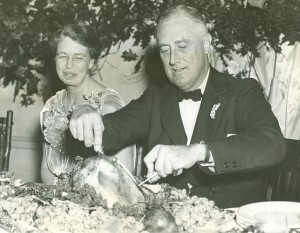Select your answer in each of the following.
1. We’re inviting the (Rubio’s/Rubios’/Rubios) and a few other candidates’ families to Thanksgiving dinner.
2. I need the (Clinton’s/Clintons/Clintons’) banana cream pie recipe, but I don’t have Hillary’s email address.
3. We hope the (Bush’s/Bushes/Bushes’) know we don’t have room for their entire family.
4. Ivanka said she’d keep an eye on the (children’s/childrens/childrens’) table.
5. My in-laws are joining us so the working (class’s/class’/classes) voice is represented.
6. The (Cruzes/Cruz’s/Cruzes’) are bringing a Tex-Mex appetizer.
7. After dinner we’re using the Sanders’/Sander’s/Sanderses’ minivan to take all the leftovers to a soup kitchen.
Political correctness
1. We’re inviting the Rubios and a few other candidates’ families to Thanksgiving dinner. Resist the temptation to attach an apostrophe to a name when making it plural. Treat the name as you would a word.
2. I need the Clintons’ banana cream pie recipe, but I don’t have Hillary’s email address. Names and words that are pluralized with an “s” need an apostrophe at the end to show possession.
3. We hope the Bushes know we don’t have room for their entire family. Some names (and words) need “es” for the plural form because we are adding a syllable. Again, resist the impulse to consider an apostrophe.
4. Ivanka said she’d keep an eye on the children’s table. Some plural words, like “men,” “women,” “alumni,” “mice,” and “children” have no “s” or “es” at the end. In these cases, although the word is plural, we add an apostrophe and “s” to show possession.
5. My in-laws are joining us so the working class’s (or class’) voice is represented. When a singular word ends in “s” (or “ss”), style guides differ on using just an apostrophe or an apostrophe and an “s.” And some that do prefer an apostrophe and “s” after “ss” don’t play it that way if the following word starts with “s.” For example, I didn’t tell you about my class’ summer project. Complicated! But the good news is that you’re safe with class’ or class’s, so pick a style and stick with it. The key is consistency.
6. The Cruzes are bringing a Tex-Mex appetizer. This is just like #3 (Bushes). We have to add a syllable to make the name plural, and then we’re done.
7. After dinner we’re using the Sanderses’ minivan to take all the leftovers to a soup kitchen. Abiding by the rules, we need to make the name plural and then possessive, but you might feel that treatment seems awkward here. Keep reading.
Escape hatches
When being correct may be distracting, as in #5 (class’s or class’) or #7 (Sanderses’), it’s wise to create an escape hatch by rewording. In #5 we can treat the phrase “working class” as an adjective to avoid making it possessive: My in-laws are joining us so the working class voice (or voice of the working class) is represented. In #7 we might reword this way: After dinner we’re using the Sanders family’s minivan to take all the leftovers to a soup kitchen.
Equal time
If any presidential candidates are miffed about not being mentioned in this post, their staffs can let me know. I’ll be glad to work them in next time.
In addition to presenting workshops on writing in the workplace, Norm is a writer, editor, and writing coach. His 100+ Instant Writing Tips is a brief “non-textbook” to help individuals overcome common writing errors and write with more finesse and impact. Learn more at http://www.normfriedman.com/index.shtml.

